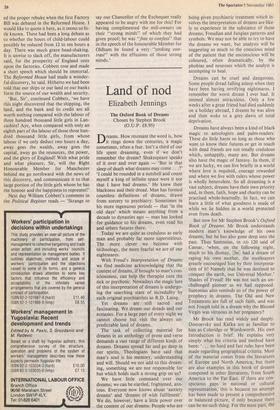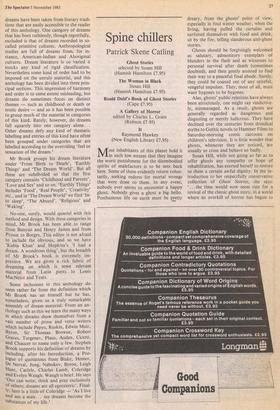Land of nod
Elizabeth Jennings
The Oxford Book of Dreams Chosen by Stephen Brook (O.U.P. £8.95)
in reams. How resonant the word is, how it rings down the centuries, a magic sometimes, often a fear. Isn't a third of our life spent dreaming, even if we don't remember the dream? Shakespeare speaks of it over and over again — 'But in that sleep of death what dreams may come . . .?' 'I could be rounded in a nutshell and count myself a king of infinite space were it not that I have bad dreams.' He knew their blackness and their dread. Man has formed countless definitions of dreams, drawn from sorcery to psychiatry. Sometimes in his more ingenuous periods — that 'in the old days' which means anything from a decade to dynasties ago — man has looked for guidance to his dreams, even read his and others futures there.
Today we are quite as credulous as early man and probably far more superstitious. The more clever we become with technology, the more fearful we are of our nightmares.
With Freud's Interpretation of Dreams we find medicine acknowledging that the content of dreams, if brought to man's con- sciousness, can help the therapist cure the sick or psychotic. Nowadays the magic lure of this interpretation of dreams is undergo- ing the searching stare of incredulity by such original psychiatrists as R.D. Laing.
Yet dreams are still sacred and fascinating. We dream our dreads and our ecstasies. For a large part of every night we cannot choose but visit the always un- predictable land of dreams.
The task of collecting material for dreams in an anthology of prose and verse demands a vast range of different kinds of dreams. Dreams spread far and go deep in our spirits. Theologians have said that man's soul is his memory, understanding and will. Should we not add to this dream- ing, something we are not responsible for but which holds such a strong grip on us?
We have little command over our dreams; we can be startled, frightened, anx- ious. Everyone now knows about 'anxiety dreams' and 'dreams of wish fulfilment'. We do, however, have a little power over the content of our dreams. People who are being given psychiatric treatment which in- volves the interpretation of dreams are like- ly to experience in the substance of those dreams, Freudian and Jungian patterns and symbols. We may not be able to try to have the dreams we want, but analysts will be suggesting so much to the conscious mind of the patient that the unconscious will be coloured, often dramatically, by the phobias and neuroses which the analyst is attempting to heal.
Dreams can be cruel and dangerous. Some people dread falling asleep when they have been having terrifying nightmares. 1 remember the worst dream I ever had. It seemed almost miraculous. Only a few weeks after a great friend had died suddenly on a holiday abroad, I dreamt he was alive and then woke to a grey dawn of total deprivation.
Dreams have always been a kind of black magic to astrologists and palm-readers. These do little harm so long as those who want to know their futures or get in touch with dead friends are not totally credulous which, unhappily, many are. But dreams also have the magic of fantasy. In them, if we are lucky, we can live briefly in a world where love is requited, courage rewarded and where we live with rulers whose power is wholly benevolent. So all dreaming is a vast subject, dreams have their own priority and, in them, faith, hope and charity can be practised whole-heartedly. In fact, we can learn a little of what goodness is made of while we lie hidden in a world protected even from death.
But now for Mr Stephen Brook's Oxford Book of Dreams. Mr Brook understands modern man's knowledge of his own dreams, but he has also gone deep into the past. Thus Suetonius, in AD 120 said of Caesar, 'when, on the following night, much to his dismay, [he] had a dream of raping his own mother, the soothsayers greatly encouraged him by their interpreta- tion of it! Namely that he was destined to conquer the earth, our Universal Mother.' Shades of Freud! He was not such an un- challenged pioneer as we had supposed. Suetonius also reminds us of the power of prophecy in dreams. The Old and New Testaments are full of such faith, and was not Joseph told in a dream why the Blessed Virgin was virtuous in her pregnancy?
Mr Brook has read widely and deeply. Dostoevsky and Kafka are as familiar to him as Coleridge or Wordsworth. His own Introduction is brief. He explains very simply what his criteria and method have been: ... no hard and fast rules have been made regarding geographical criteria. Most of the material comes from the literatures of Europe and North America, but there are also examples in this book of dreams composed in other literatures, from South America to the Far East. If there are con- spicuous gaps in national or cultural representation, this is because no attempt has been made to present a comprehensive or balanced picture, if only because there can be no such thing. For the most part, the
dreams have been taken from literary tradi- tions that are easily accessible to the reader of this anthology. One category of dreams that has been ruthlessly, though regretfully, excluded is that of dreams recorded in so- called primitive cultures. Anthropological studies are full of dreams from, for in- stance, American-Indian and Aboriginal cultures. Dream literature is so varied it mocks any kind of rigid classification. Nevertheless some kind of order had to be imposed on the unruly material, and this anthology has been divided into three prin- cipal sections, This impression of harmony and order is to some extent misleading, but dreams do sometimes focus on distinct themes — such as childhood or death or erotic desire — and so it has been possible to group much of the material in categories of this kind. Rarely, however, do dreams fall squarely into one category alone... Other dreams defy any kind of thematic labelling and entries of this kind have often been grouped under categories that are labelled according to the overriding 'feel or sensation of the dream.'
Mr Brook groups his dream literature under 'From Birth to Death', 'Earthly Things' and 'The Dream World'. But all these are subdivided so that the first category contains 'Childhood and Parents', 'Love and Sex' and so on. 'Earthly Things' includes 'Food', 'Real People', 'Creativity' etc., and in 'The Dream World' we find 'In- to sleep', 'The Absurd', 'Religious' and 'Waking'.
No-one, surely, would quarrel with this method and design. With these categories in mind, .Mr Brook has been able to range from Bunyan and Henry James and from Proust to Borges. This editor is not afraid to include the obvious, and so we have 'Kubla Khan' and Hopkins's 'I had a dream. A wondrous thing', but the breadth of Mr Brook's book is extremely im- pressive. We are given a rich fabric of dreaming on which is, sewn relevant material from Latin poets to Louis MacNeice and Yeats.
Some inclusions in this anthology do seem rather far from the definition which Mr Brook has set himself but he has, nonetheless, given, us a truly remarkable assembly of dream material. From an an- thology such as this we learn the many ways In which dreams show themselves from a vast number of prose and verse writers which include Pepys, Ruskin, Edwin Muir, Byron, Sir Thomas Browne, Robert Graves, Turgenev, Plato, Auden, Cicero, and Chaucer to name only a few. Stephen Brook supports his definition of dreams by Including, after his Introduction, a Pro- logue of quotations from Blake, Homer, De Nerval, Jung, Nabokov, Byron, Leigh Hunt, Carlyle, Charles Lamb, Coleridge and Evelyn Waugh. Waugh is brief. He says One can write, think and pray exclusively 01 others; dreams arc all egocentric'. Final- ly, here is a little of Coleridge — 'As I live and am a man... my dreams become the substances of my life.'















































 Previous page
Previous page